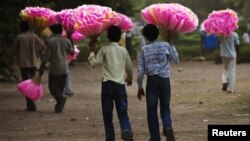NEW DELHI — India will formulate an economic revival plan to tackle a loss of investor confidence as the country's economic growth dips to its slowest pace in nearly a decade.
Prime Minister Manmohan Singh has called on officials to take measures to revive the “animal spirit” in the country’s economy and reverse a climate of pessimism.
His remarks came after taking charge of the finance portfolio from Pranab Mukherjee, who stepped down earlier this week as finance minister to run for president.
Singh has identified the problems that need fixing: dipping economic growth, high inflation, an industrial slowdown, flight of capital from the country and a weakening currency.
The government’s Chief Economic Adviser, Kaushik Basu, is reassuring businesses that the government is working to reverse the recent slowdown. Economic growth slipped to 6.5 percent in the last fiscal year, the slowest in almost a decade.
“We want to clarify as much as possible that we want to facilitate the industry to perform better and this facilitation is indeed a correction that we have to make, we have to improve on that…we are all hopeful that the economy will bounce back within four five months.”
Businesses have been calling on the government to speed up infrastructure development and other projects and adopt more investor friendly policies.
And as the economy comes directly under the prime minister’s watch, hopes have risen that policy makers will address such problems.
Some of the optimism stems from Singh’s credentials. He is a technocrat who liberalized India’s economy in the 1990’s when he was finance minister and paved the way for its emergence on the global stage as an economic powerhouse.
D.K. Joshi, chief economist at ratings agency Crisil in Mumbai, said officials are motivated because the situation has worsened.
“The macro economic scenario has become quite weak right now," said Joshi. "So I think it needs a push on the policy side and I think it will happen. It is difficult to time it, but my sense is that we will see some positive steps going ahead.”
However, opposition from coalition partners could make it difficult for Singh to implement politically sensitive changes such as lowering subsidies and allowing foreign retailers to open stores in India.
But in the meantime, stock markets have reacted positively to Singh’s efforts to address India’s economic woes. They have risen by nearly two percent since he took charge of the finance ministry, and the rupee has strengthened against the dollar after hitting an all time low last week.
Prime Minister Manmohan Singh has called on officials to take measures to revive the “animal spirit” in the country’s economy and reverse a climate of pessimism.
His remarks came after taking charge of the finance portfolio from Pranab Mukherjee, who stepped down earlier this week as finance minister to run for president.
Singh has identified the problems that need fixing: dipping economic growth, high inflation, an industrial slowdown, flight of capital from the country and a weakening currency.
The government’s Chief Economic Adviser, Kaushik Basu, is reassuring businesses that the government is working to reverse the recent slowdown. Economic growth slipped to 6.5 percent in the last fiscal year, the slowest in almost a decade.
“We want to clarify as much as possible that we want to facilitate the industry to perform better and this facilitation is indeed a correction that we have to make, we have to improve on that…we are all hopeful that the economy will bounce back within four five months.”
Businesses have been calling on the government to speed up infrastructure development and other projects and adopt more investor friendly policies.
And as the economy comes directly under the prime minister’s watch, hopes have risen that policy makers will address such problems.
Some of the optimism stems from Singh’s credentials. He is a technocrat who liberalized India’s economy in the 1990’s when he was finance minister and paved the way for its emergence on the global stage as an economic powerhouse.
D.K. Joshi, chief economist at ratings agency Crisil in Mumbai, said officials are motivated because the situation has worsened.
“The macro economic scenario has become quite weak right now," said Joshi. "So I think it needs a push on the policy side and I think it will happen. It is difficult to time it, but my sense is that we will see some positive steps going ahead.”
However, opposition from coalition partners could make it difficult for Singh to implement politically sensitive changes such as lowering subsidies and allowing foreign retailers to open stores in India.
But in the meantime, stock markets have reacted positively to Singh’s efforts to address India’s economic woes. They have risen by nearly two percent since he took charge of the finance ministry, and the rupee has strengthened against the dollar after hitting an all time low last week.




